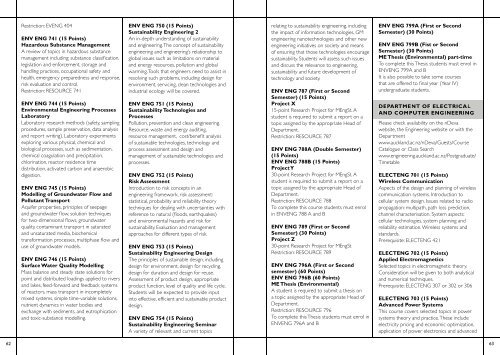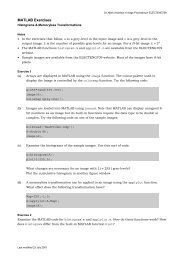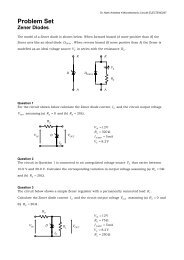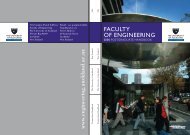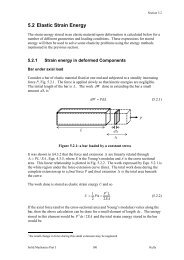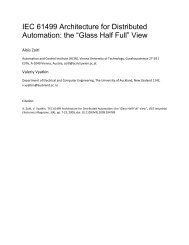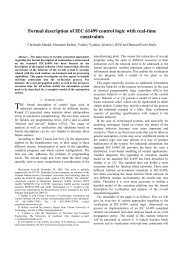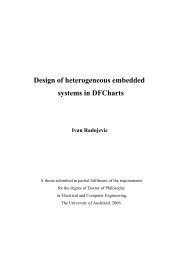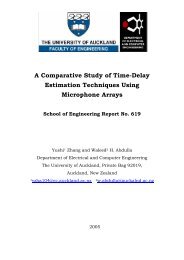www.engineering.auckland.ac.nz faculty of engineering
www.engineering.auckland.ac.nz faculty of engineering
www.engineering.auckland.ac.nz faculty of engineering
Create successful ePaper yourself
Turn your PDF publications into a flip-book with our unique Google optimized e-Paper software.
Restriction: EVENG 404<br />
ENV ENG 741 (15 Points)<br />
Hazardous Substance Management<br />
A review <strong>of</strong> topics in hazardous substance<br />
management including: substance classification,<br />
legislation and enforcement, storage and<br />
handling pr<strong>ac</strong>tices, occupational safety and<br />
health, emergency preparedness and response,<br />
risk evaluation and control.<br />
Restriction: RESOURCE 741<br />
ENV ENG 744 (15 Points)<br />
Environmental Engineering Processes<br />
Laboratory<br />
Laboratory research methods (safety, sampling<br />
procedures, sample preservation, data analysis<br />
and report writing). Laboratory experiments<br />
exploring various physical, chemical and<br />
biological processes, such as sedimentation,<br />
chemical coagulation and precipitation,<br />
chlorination, re<strong>ac</strong>tor residence time<br />
distribution, <strong>ac</strong>tivated carbon and anaerobic<br />
digestion.<br />
ENV ENG 745 (15 Points)<br />
Modelling <strong>of</strong> Groundwater Flow and<br />
Pollutant Transport<br />
Aquifer properties, principles <strong>of</strong> seepage<br />
and groundwater flow, solution techniques<br />
for two-dimensional flows, groundwater<br />
quality, contaminant transport in saturated<br />
and unsaturated media, biochemical<br />
transformation processes, multiphase flow and<br />
use <strong>of</strong> groundwater models.<br />
ENV ENG 746 (15 Points)<br />
Surf<strong>ac</strong>e Water Quality Modelling<br />
Mass balance and steady state solutions for<br />
point and distributed loadings applied to rivers<br />
and lakes, feed-forward and feedb<strong>ac</strong>k systems<br />
<strong>of</strong> re<strong>ac</strong>tors, mass transport in incompletely<br />
mixed systems, simple time-variable solutions,<br />
nutrient dynamics in water bodies and<br />
exchange with sediments, and eutrophication<br />
and toxic-substance modelling.<br />
ENV ENG 750 (15 Points)<br />
Sustainability Engineering 2<br />
An in-depth understanding <strong>of</strong> sustainability<br />
and <strong>engineering</strong>. The concept <strong>of</strong> sustainability<br />
<strong>engineering</strong> and <strong>engineering</strong>’s relationship to<br />
global issues such as limitations on material<br />
and energy resources, pollution and global<br />
warming. Tools that engineers need to assist in<br />
resolving such problems, including design for<br />
environment, servicing, clean technologies and<br />
industrial ecology will be covered.<br />
ENV ENG 751 (15 Points)<br />
Sustainability Technologies and<br />
Processes<br />
Pollution, prevention and clean <strong>engineering</strong>.<br />
Resource, waste and energy auditing,<br />
resource management, cost/benefit analysis<br />
<strong>of</strong> sustainable technologies, technology and<br />
process assessment and design and<br />
management <strong>of</strong> sustainable technologies and<br />
processes.<br />
ENV ENG 752 (15 Points)<br />
Risk Assessment<br />
Introduction to risk concepts in an<br />
<strong>engineering</strong> framework, risk assessment:<br />
statistical, probability and reliability theory<br />
techniques for dealing with uncertainties with<br />
reference to natural (floods, earthquakes)<br />
and environmental hazards and risk for<br />
sustainability. Evaluation and management<br />
appro<strong>ac</strong>hes for different types <strong>of</strong> risk.<br />
ENV ENG 753 (15 Points)<br />
Sustainability Engineering Design<br />
The principles <strong>of</strong> sustainable design, including<br />
design for environment, design for recycling,<br />
design for duration and design for reuse.<br />
Assessment <strong>of</strong> product design, appropriate<br />
product function, level <strong>of</strong> quality and life cycle.<br />
Students will be expected to provide input<br />
into effective, efficient and sustainable product<br />
design.<br />
ENV ENG 754 (15 Points)<br />
Sustainability Engineering Seminar<br />
A variety <strong>of</strong> relevant and current topics<br />
relating to sustainability <strong>engineering</strong>, including<br />
the imp<strong>ac</strong>t <strong>of</strong> information technologies, GM<br />
<strong>engineering</strong> nanotechnologies and other new<br />
<strong>engineering</strong> initiatives on society and means<br />
<strong>of</strong> ensuring that those technologies encourage<br />
sustainability. Students will assess such issues<br />
and discuss the relevance to <strong>engineering</strong>,<br />
sustainability and future development <strong>of</strong><br />
technology and society.<br />
ENV ENG 787 (First or Second<br />
Semester) (15 Points)<br />
Project X<br />
15-point Research Project for MEngSt. A<br />
student is required to submit a report on a<br />
topic assigned by the appropriate Head <strong>of</strong><br />
Department.<br />
Restriction: RESOURCE 787<br />
ENV ENG 788A (Double Semester)<br />
(15 Points)<br />
ENV ENG 788B (15 Points)<br />
Project Y<br />
30-point Research Project for MEngSt. A<br />
student is required to submit a report on a<br />
topic assigned by the appropriate Head <strong>of</strong><br />
Department.<br />
Restriction: RESOURCE 788<br />
To complete this course students must enrol<br />
in ENVENG 788 A and B<br />
ENV ENG 789 (First or Second<br />
Semester) (30 Points)<br />
Project Z<br />
30-point Research Project for MEngSt<br />
Restriction: RESOURCE 789<br />
ENV ENG 796A (First or Second<br />
semester) (60 Points)<br />
ENV ENG 796B (60 Points)<br />
ME Thesis (Environmental)<br />
A student is required to submit a thesis on<br />
a topic assigned by the appropriate Head <strong>of</strong><br />
Department.<br />
Restriction: RESOURCE 796<br />
To complete this Thesis students must enrol in<br />
ENVENG 796A and B<br />
ENV ENG 799A (First or Second<br />
Semester) (30 Points)<br />
ENV ENG 799B (Fist or Second<br />
Semester) (30 Points)<br />
ME Thesis (Environmental) part-time<br />
To complete this Thesis students must enrol in<br />
ENVENG 799A and B<br />
It is also possible to take some courses<br />
that are <strong>of</strong>fered to final year (Year IV)<br />
undergraduate students.<br />
DEPARTMENT OF ELECTRICAL<br />
AND COMPUTER ENGINEERING<br />
Please check availability on the nDeva<br />
website, the Engineering website or with the<br />
Department<br />
<strong>www</strong>.<strong>auckland</strong>.<strong>ac</strong>.<strong>nz</strong>/nDeva/Guests/Course<br />
Catalogue or Class Search<br />
<strong>www</strong>.<strong>engineering</strong>.<strong>auckland</strong>.<strong>ac</strong>.<strong>nz</strong>/Postgraduate/<br />
Timetable<br />
ELECTENG 701 (15 Points)<br />
Wireless Communication<br />
Aspects <strong>of</strong> the design and planning <strong>of</strong> wireless<br />
communication systems. Introduction to<br />
cellular system design. Issues related to radio<br />
propagation: multipath, path loss prediction,<br />
channel char<strong>ac</strong>terisation. System aspects:<br />
cellular technologies, system planning and<br />
reliability estimation. Wireless systems and<br />
standards.<br />
Prerequisite: ELECTENG 421<br />
ELECTENG 702 (15 Points)<br />
Applied Electromagnetics<br />
Selected topics in electromagnetic theory.<br />
Consideration will be given to both analytical<br />
and numerical techniques.<br />
Prerequisite: ELECTENG 307 or 302 or 306<br />
ELECTENG 703 (15 Points)<br />
Advanced Power Systems<br />
This course covers selected topics in power<br />
systems theory and pr<strong>ac</strong>tice. These include<br />
electricity pricing and economic optimization,<br />
application <strong>of</strong> power electronics and advanced<br />
62<br />
63


